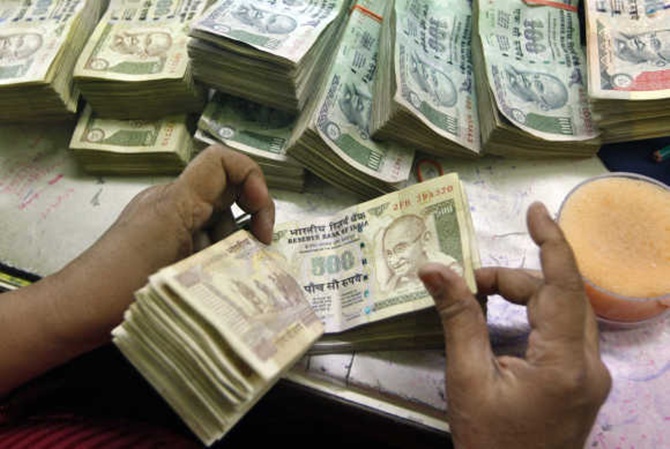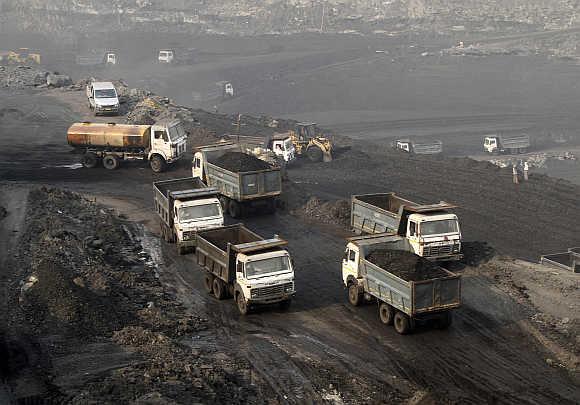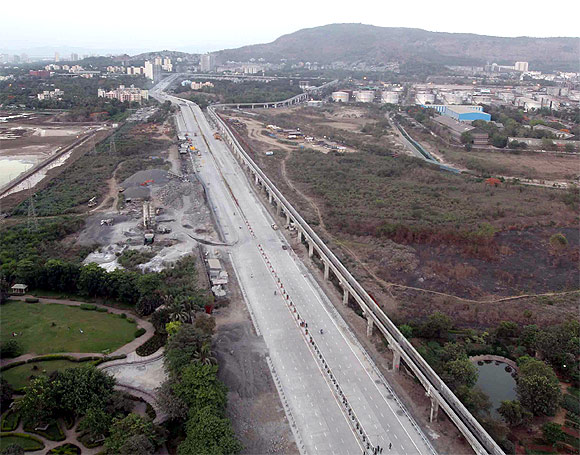Photographs: Krishnendu Halder/Reuters BS Bureau
The safe conclusion to draw from the second-quarter gross domestic product (GDP) numbers that were published last Friday is that the cycle has bottomed out and things are unlikely to get any worse.
With year-on-year growth being estimated at 4.8 per cent, somewhat higher than the 4.4 per cent recorded during the previous quarter, it might be tempting to see signs of a recovery, but that would be excessively optimistic.
While agriculture, which grew by 4.6 per cent during the quarter, was a significant contributor to this modest acceleration, manufacturing also played a role, with its growth rising from a negative 1.2 per cent to a positive one per cent between the first and second quarters.
…
Why there is hope for the Indian economy
Photographs: Reuters
Evidently, a combination of a good monsoon and an appreciable increase in exports has helped to mitigate downside risks to growth.
Importantly, this has happened even as community, social and personal services, which predominantly comprise public services, grew by 4.2 per cent, less than the aggregate. This suggests that fiscal pressures are already inducing some cutbacks in government spending, even as the private sector is steady for the moment.
One positive indication amidst the overall pattern of sluggishness is that investment seems to be holding up quite well. Gross fixed capital formation (GFCF), which measures the creation of new productive capacity in the economy, was 33.6 per cent of GDP, up slightly from 32.6 per cent in the previous quarter.
…
Why there is hope for the Indian economy
Photographs: Reuters
In the corresponding quarters of last year, these numbers were 33.8 per cent and 34.6 per cent, respectively. To put these numbers in context, during the 1997-2002 period, when growth was around five per cent, GFCF was about 25 per cent of GDP.
In other words, notwithstanding the general perception of the investment climate as being bleak, these numbers suggest that investment activity itself is relatively robust and at a level consistent with a somewhat faster rate of growth than is currently being achieved.
This represents both a challenge and an opportunity. One explanation for this disconnect is that there is an imbalance in capacity creation across sectors, resulting in less-than-optimal utilisation of capacities.
…
Why there is hope for the Indian economy
Photographs: Reuters
The lack of coal to fuel newly built power plants is a striking example. Restoring the balance, then, needs to be prioritised.
However, once this is done, there is an opportunity for growth to pick up as capacity constraints are successively eased.
Of course, this isn’t going to happen spontaneously. While a good agricultural season and a competitive exchange rate may provide some support to growth for some more time, the balancing of capacities that is required for any step-up in growth will take both time and effort.
…
Why there is hope for the Indian economy
Image: Mumbai's Eastern Freeway.Photographs: Sahil Salvi
The Cabinet Committee on Investment was supposed to speed this process along. It seems to be doing its bit to resolve inter-ministerial wrangles, but there are many more hurdles in executing projects, over which the control of the CCI is yet to be tested.
Meanwhile, the financial condition of several companies executing infrastructure projects, the success of which is critical to restoring the balance, raises doubts about the prospects of mobilising significant amounts of money for both ongoing and planned projects.
Unless this happens, capital productivity will remain low and the growth rate will be below what the investment level might have implied. Therefore, bottoming out is a safe inference; recovery isn’t yet one.







article